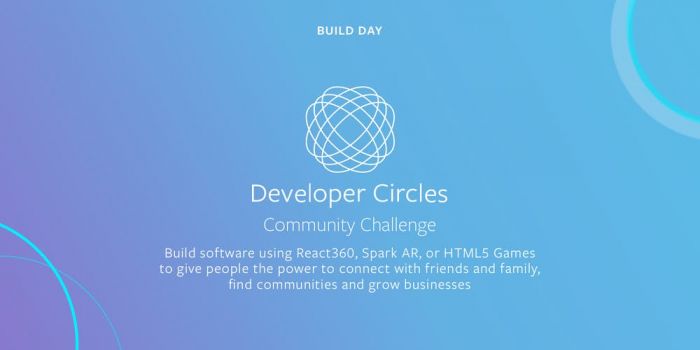
Facebook Developer Circles are a global network of local communities, designed to support developers as they build skills, grow ideas and boost their careers.
It’s often said that the best way to learn is to become the teacher. For this year’s Community Challenge, we invite you to put your own innovative spin on developer education by creating written tutorials that showcase the capabilities of Facebook technologies.
Every participant will receive special access to online education experiences with technology experts.
It’s often said that the best way to learn is to become the teacher; that a great way to reinforce a skill or achievement is by sharing it with others.
It’s with this philosophy in mind that I’m pleased to welcome you to this year’s Community Challenge, our annual online hackathon for Developer Circles members - which runs until Monday October 26.
This time around, we’re inviting participants to go a step beyond building software solutions by creating tutorials about the code they’ve created. Winners are eligible to receive up to US$133,000 in cash prizes, Oculus VR headsets and fully credited amplification of their tutorials to millions of other developers across Facebook’s ecosystem.
We’re also broadening the products that competing innovators can build with, now spanning Open Source technologies including Docusaurus, Hack, Pytorch, React and React Native, as well as Messenger, Spark AR and Wit.ai.
Within each of these products, we see enormous opportunity for you and your teammates to connect, learn and build together, all while sharing your journey step-by-step through immersive tutorials for fellow tech enthusiasts.
I invite you to check out all of the guidelines for taking part, and I thought it would also be useful to share some examples that might help bring the challenge to life.
To get you started with a template for crafting impactful tutorials, here’s a framework providing an overview of recommended sections that will be helpful to readers, including some tips and tricks.
To provide general guidance on what a published tutorial looks like, here’s an example I wrote a couple of years ago about a product called Yoga - Facebook’s cross-platform layout engine that helps developers write more layout code. Please note that this particular tutorial is on the lengthier side - remember that your submission only needs to be between 1,000-4,000 words.
To demonstrate a useful step-by-step breakdown of a project, here’s a great tutorial on a smart bookmarking tool, Rust Rocket.
To understand the potential for using video to help bring your submission to life, check out this informative Docusaurus tutorial video and this engaging React Native tutorial video.
Remember, this is a team challenge, so we recommend dividing and conquering to create your tutorial most efficiently. If you have any tutorial ideas to share with potential teammates, or if you need support with troubleshooting or any questions about the challenge, please post in our Facebook group here.
What makes our Community Challenge so special every year is the many stories of collaboration and innovation we see from all around the world. We can’t wait to discover your story and for our global community to be inspired by your submission.
Winners will take home up to US$133,000 in cash prizes and have their written tutorials credited and shared amongst millions of developers and creators across the Facebook ecosystem!
While we generally see most submissions in English, we’re also offering special language prizes across Arabic, French, Indonesian, Portuguese and Spanish.
NOT A DEVELOPER CIRCLES MEMBER YET?
It’s free and as easy as joining a Facebook group!
Connect with fellow innovators, take part in skill-building opportunities and gain practical experience by signing up for your local Circle here.
LET’S GET BUILDING!
You’ll be creating a step-by-step written tutorial that demonstrates one or more features of any of the technologies listed below:
You can create a written tutorial about your newly built software solution, or use a solution that you’ve built in the past. You can also choose to focus on a specific component within the solution.
If you’re using a sample that was written in the past, remember that you’ll need to check that your code still works with the latest version of the products being used.
Whichever option you choose, you’ll also need to submit the code that you’re explaining in your tutorial.
Learn more about different tutorial examples in this blog.
$133,000 in prizes
Global First Place - English Tutorial for Beginners
• $10,000 USD
• Oculus headset (ARV: $399USD; 1 per individual, 4 max per Org or Team)
Global Second Place - English Tutorial for Beginners
• $7,000 USD
Global First Place - English Tutorial for Advanced
• $10,000 USD
• Oculus headset (ARV: $399USD; 1 per individual, 4 max per Org or Team)
Global Second Place - English Tutorial for Advanced
• $7,000 USD
Regional - English Tutorial for Beginners (21)
• $2,000 USD
Regional - English Tutorial for Advanced (21)
• $2,000 USD
Local Language - Tutorial for Beginners (5)
• $1,500 USD
Local Language - Tutorial for Advanced (5)
• $1,500 USD
Main Requirement: Create a step-by-step written tutorial that demonstrates the use of one or more features of any of the technologies below.
In your tutorial, use Open Source sample code from your newly built solution or use a solution that you’ve built in the past. If you are using an existing solution, be sure it works with the latest version of the products being used.
Curious to learn more about beginner versus advanced tutorials? Visit our Resources page
Submit the following assets:
REQUIRED
OPTIONAL
See The Complete Details About this Competition Here
Leave a Comment